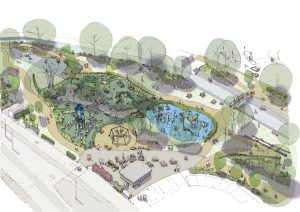Round table report: Creating a truly sustainable city for the future
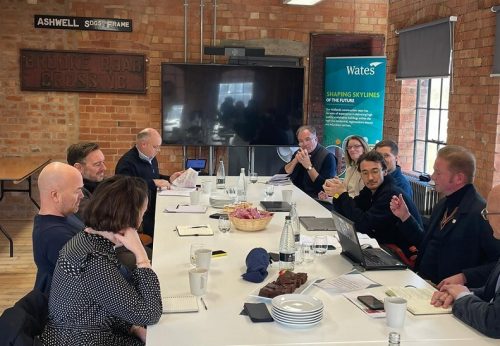

Our latest round table, in Derby, discussed how the city is partnering with specialist developers such as leading privately-owned, construction, development and property services company, Wates to bring not only the historic Derby Market Hall back to its former glory – but the wider city centre itself – to create a truly sustainable city centre.
John Carlin, regional director at Wates, is a man with a mission. He wants Derby Market Hall to be the catalyst not only for giving Derby a sustainable city centre, but also to move Wates closer to its own net zero aims.
“Even on a winter’s day Derby Market Hall will require very little lighting,” said Carlin. We are making incremental improvements each day to our business – and the Derby Market Hall project is helping that.”
The second phase of the highly-anticipated Derby Market Hall refurbishment has begun, with a host of internal and external improvements in the pipeline.
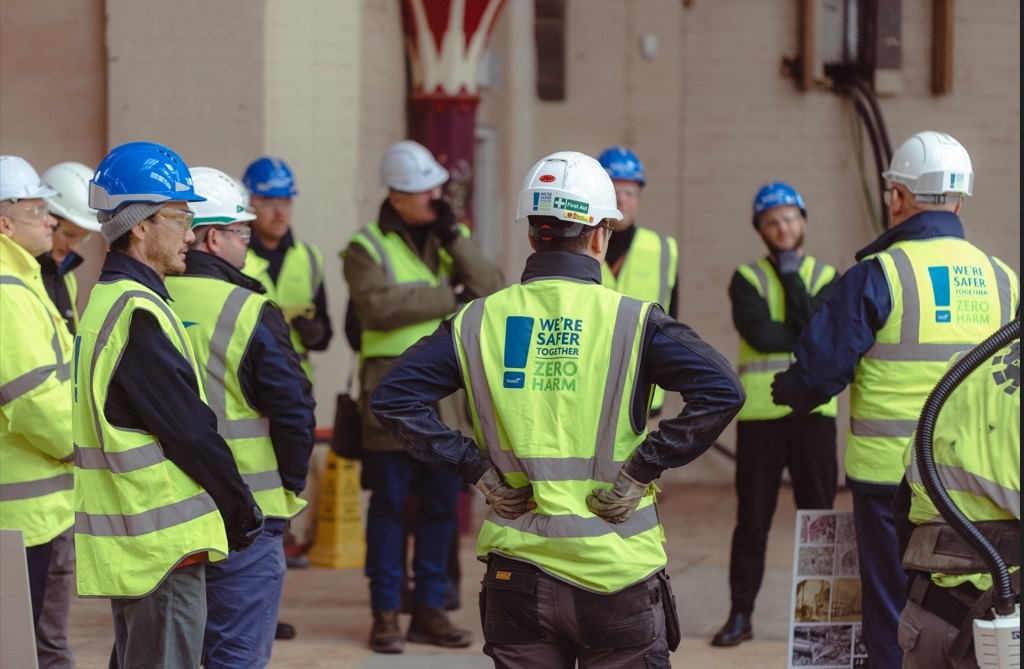
Our guests on a tour of Derby Market Hall
The Victorian Market Hall on Tennant Street is set to become a retail and leisure destination, linking the Derbion shopping centre and St Peter’s Quarter to the Cathedral Quarter and the Becketwell regeneration scheme.
An integral part of this next phase is to develop the public space at Osnabruck Square, a key entrance to the Grade II listed building, as well as reinstating the north entrance.
The refurbishment is being led by Wates, which is working in collaboration with Derby City Council. The project team is made up of specialists operating within the region, including Lathams Architects, structural engineers Rodgers Leask, and M&E consultants Clancy.
Chris Twomey of Lathams says the project is a “huge challenge”. He added: “It’s a listed building, so everything is treated with care- and an eye on flexibility and the future.”
For Jack Hemingway of Hemingway Design, sustainability isn’t just about environmental gains; he said we have to think about social sustainability too.
He added: “Derby Market Hall is a wonderful building in an important part of the city centre and repurposing it is the right thing to do. It’s essentially a container and a backdrop for activity – and it’s also important what surrounds the building and that any investment is properly spread out.
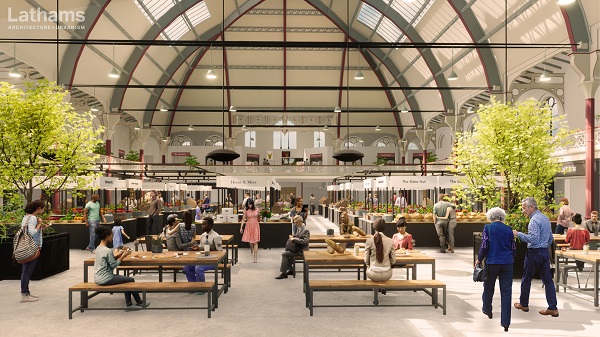
How the interior of the Market Hall will look
“The challenge is going to be making sure that the experiences and activity that happens within it benefits and helps with placemaking and shaping. This project is one of the key catalysts that can shift the dynamic.”
Ross Nicholson of Down to Earth Derby agreed and added: “The Market Hall needs to be a demonstration of all of that. It should be about bringing belief back to the city and showing off what we’re capable of.”
Richard Watson from The Island Quarter scheme in Nottingham was an interested outside observer. He asked the panel: “How do you regard success? Is it carbon zero or 100% tenancy occupation? At the end of the day, it’s all about getting people into cities. How is the city going to judge success?”
Nicholson thought that the quickest route to get there was to get the public realm work right.
His colleague at Down to Earth Derby, Jamie Quince Starkey added: “I think it’s a cultural challenge, it’s storytelling – and it’ll take a long time to change perceptions of the city – but we have to empower people. We need to make people believe they want to be in Derby.”
This was familiar ground for Kathryn Allen of Marketing Derby. She said: “That resonates with our investment strategy. We talk increasingly about experience – and understanding who visitors are going to be and the need to know 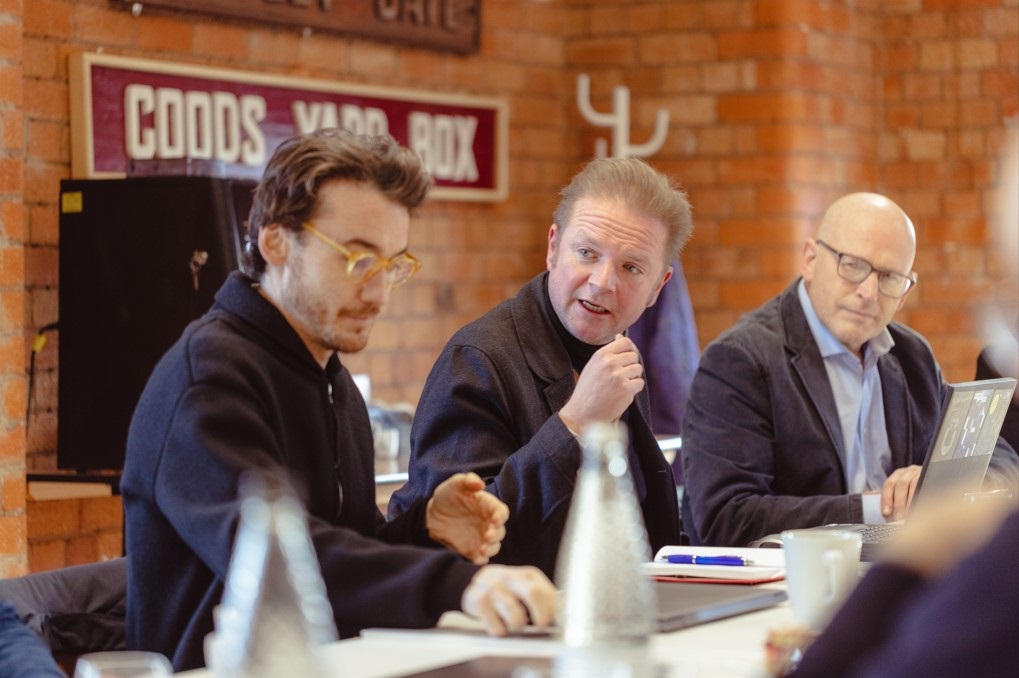
Paul Simpson of Derby City Council thought the Market Hall redevelopment has “huge significance”- but challenges remain.
He said: “The challenge is: how do we get people to use some of the more beautiful buildings in the city? How do we get footfall to the centre of the city? The Market Hall can draw people out of Derbion, but on its own it’s not good enough. We need offices in the city centre to get suits on the ground too.”
Lisa Cunningham of Wates saw the issue as cyclical. She said: “We need the city centre to be as good as it possibly can be; because if the university can’t attract students, then neither will the businesses be able to.”
Hemingway added: “Pride Park has been a huge success for Derby, but maybe small parts of what’s made it such a success need to be brought into the town centre.
“City centres never used to be places to go to shop; they used to be places to come together. We need Derby city centre to be transformational and show the way forward for urban centres.”
Jack Duthie of Mace said the public sector also has an important role to play. “Local authorities need to be offering diverse experiences,” he said. “It can’t be all retail, or all leisure – there needs to be something for everyone.
“The Market Hall project can be a catalyst for the city centre and drive investment into Derby.”
Allen said that one thing Derby has become very good at is attracting residential investment. She added: “We have urban villages that we’ve not had for decades. Now we need to get the residents of these to use the city centre as their back gardens.”
Immediately prior to the round table event, the panel was treated to a tour of the work in progress at Derby Market Hall. Wates has been able to call on its vastly experienced specialist tradespeople, along with a raft of local and regional craftspeople, to deliver the project.
Carlin said: “We’ve been very lucky that those skills still exist in Derbyshire and Nottinghamshire. The Market Hall will showcase these skills and hopefully make people want to continue them. It’s one incremental step at a time.”
Cunningham added: “We’ve got a good track record of restoring historic buildings across the Midlands. It’s up to us to sustain that.”
Carlin said: “And not being shy about telling people what we’re good at. We look to positively impact everyone with our projects and develop social value for the community. We’re also committed to protecting and enhancing the environment and creating an identity for Derby.”
Wates was appointed to redevelop Derby Market Hall via SCAPE’s Major Works framework. The second phase of development is set to complete at the end of 2024.





